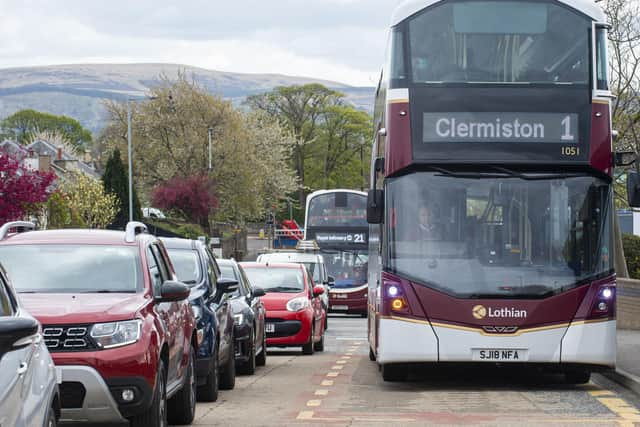Motoring costs would have to double without major bus funding hike to meet emissions targets – Confederation of Passenger Transport
A report commissioned by the Confederation of Passenger Transport Scotland (CPT), which represents operators, has highlighted a major gap between the expected increase in bus passengers from existing Scottish Government policy and the scale of such “modal shift” needed from car to bus.
It said just one fifth of the shift required towards Scotland's most significant form of public transport would be achieved without policy change. Ministers have set a target of reducing transport emissions by 75 per cent by 2030 and reaching net zero by 2045.
Advertisement
Hide AdAdvertisement
Hide AdBut the report, published on Wednesday, stated: “It is clear that while this is achievable, piecemeal interventions will not deliver the scale of change required. Instead, an ambitious strategy will be needed.


"Without further interventions and investment in bus and coach, the cost of motoring in Scotland would need to rise by 133 per cent by 2050 in order to drive the scale of modal shift needed to support net zero.”
However, the report acknowledged the move would not be viable, likely to cause significant economic damage and be “politically unpalatable”. Instead, the report by WPI Economics, said increased funding, a £2 fares cap and congestion charging in urban areas, could respectively generate millions more bus journeys and cut car trips.
It called for such a “realistic, fair and politically-achievable package of policies” to encourage people to switch two car journeys a month to bus or coach, which it said would reduce carbon dioxide emissions by the equivalent of the total transport emissions in Aberdeen.
The report said that could get Scotland three quarters of the way to its net-zero goal “while making buses faster, cheaper and more convenient”.
CPT Scotland director Paul White said: “Without long-term investment in the funding of services and infrastructure to make bus and coach journeys more attractive for passengers, Scotland will not be able to effectively contribute to Scotland’s 2045 net zero target.
“This is why decision makers in Scotland should get on board with bus policy packages because they are fair and achievable measures to slash carbon, generate new tax revenue, create more jobs and make people healthier.”
The Scottish Government’s Transport Scotland agency said its concessionary fare scheme was the UK’s most generous, while it was reviewing fares for those who paid for their bus travel.
Advertisement
Hide AdAdvertisement
Hide AdIts spokesperson said: “We invest £300 million annually to deliver free bus travel for the under-22s as well as for eligible disabled people and everyone aged 60 and over, with more than 2.3m people eligible.
“This encourages more people to choose to take the bus and helps us meet our net-zero targets by encouraging a shift away from cars.
"In the coming months, we will publish our final 20 per cent car kilometre reduction route map, setting out a decisive, evidence-led approach, which recognises that the cost of motoring relative to public transport needs to be addressed."
The agency said its ongoing Fair Fares review would “ensure a sustainable and integrated approach to fares that supports the long-term viability of our public transport system”.
Comments
Want to join the conversation? Please or to comment on this article.